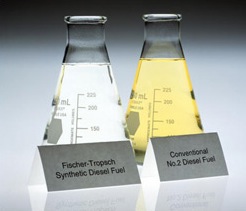Synthetic fuel facts for kids
A synthetic fuel, often called "synfuel," is a special type of fuel. It can be made into a liquid or gas. Unlike regular fuels that come directly from crude oil, synfuels are manufactured. They can be created from things like coal, or from oil found in shale rock or tar sands. Even non-food crops can be used to make them!
Tar sands are a mix of sand and a very thick, sticky oil called bitumen. Oil shale is a type of rock with oil-like substances inside it. To get the oil out of these, they are heated with steam. Just like regular crude oil, the oil from tar sands and oil shale needs to be cleaned and processed before it can be used as fuel.
Contents
What Are Synthetic Fuels?
Synthetic fuels are fuels that are not found naturally in their final form. Instead, they are made through chemical processes. This is different from gasoline or diesel, which are refined directly from crude oil pumped from the ground. Synfuels can be made from many different sources, called "feedstocks." These include coal, natural gas, biomass (like plants), and even waste materials.
How Are Synthetic Fuels Made?
Making synthetic fuels involves changing the raw materials into a usable liquid or gas. One common way is called the Fischer-Tropsch (FT) process. This process takes a gas mixture, often made from coal or natural gas, and turns it into liquid fuels like synthetic diesel or jet fuel.
From Coal and Biomass
Coal can be turned into a gas, and then that gas can be processed into liquid fuel. Biomass, which is plant material, can also be used. This means we could potentially make fuel from things like wood chips or special energy crops.
From Tar Sands and Oil Shale
Tar sands contain bitumen, a very heavy and thick form of petroleum. Oil shale contains kerogen, which is a solid organic material that turns into oil when heated. Both of these need to be mined and then processed. They are often heated to separate the oil-like substances from the rock or sand. This crude oil then needs to be refined, just like regular crude oil.
Why Are Synthetic Fuels Important?
Synthetic fuels can offer some benefits. For example, fuels made using the Fischer-Tropsch process are often very clean. They have almost no sulfur or other impurities. This means they can burn more cleanly than traditional fuels, which can reduce air pollution.
Cleaner Emissions
When synthetic diesel or jet fuel is burned, it can produce fewer harmful emissions. This includes less soot (particulate matter) and other pollutants coming out of vehicle tailpipes or aircraft engines. This is good for air quality.
Energy Security
Synthetic fuels can also help countries rely less on imported oil. If a country has a lot of coal or biomass, it can use these to make its own fuel. This can make a country's energy supply more secure.
Images for kids
See also
 In Spanish: Combustible sintético para niños
In Spanish: Combustible sintético para niños
 | George Robert Carruthers |
 | Patricia Bath |
 | Jan Ernst Matzeliger |
 | Alexander Miles |







